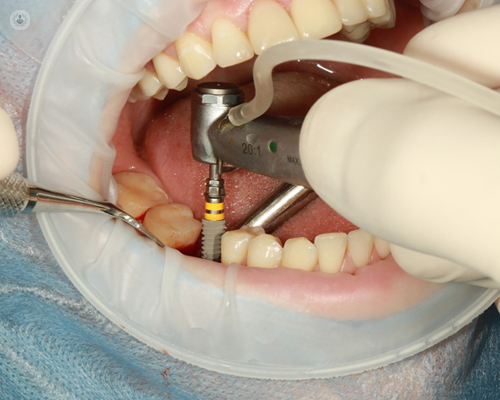Dental implant procedures: What's involved?
Written in association with:Dental implants are a popular and effective solution for replacing missing teeth, providing a strong foundation for fixed or removable replacement teeth designed to match your natural teeth.
Understanding what’s involved in the dental implant procedure can help you prepare for the process and ensure the best possible outcome. Here to explain further is leading dental implant surgeon Dr Nik Vourakis.

What are dental implants?
Dental implants are artificial tooth roots made of titanium that are surgically placed into the jawbone beneath your gums. Once in place, they allow your dentist to mount replacement teeth or a bridge onto them. Implants provide a stable support for artificial teeth because they fuse to your jawbone.
Why might I need dental implants?
Dental implants are used to replace missing teeth and offer several benefits:
- Improved appearance: They look and feel like your own teeth.
- Improved speech: Unlike poorly fitting dentures, implants allow you to speak without worrying about teeth slipping.
- Improved comfort: Because they become part of you, implants eliminate the discomfort of removable dentures.
- Easier eating: Implants function like your own teeth, allowing you to eat your favourite foods with confidence and without pain.
- Improved self-esteem: Dental implants can give you back your smile and help you feel better about yourself.
- Improved oral health: Implants don’t require reducing other teeth, as a tooth-supported bridge does. This means more of your own teeth are left intact, improving long-term oral health.
What is involved in the dental implant procedure?
Initial consultation and planning
During your first visit, your dentist will conduct a thorough examination to assess your oral health and determine if dental implants are right for you. This may include:
- Reviewing your medical and dental history
- Taking X-rays and possibly 3D images of your jaw
- Discussing your expectations and treatment options
Bone grafting (if necessary)
If your jawbone isn’t thick enough or is too soft, you may need bone grafting before you can have dental implant surgery. This is because the powerful chewing action of your mouth exerts great pressure on your bone, and the bone must be strong enough to support the implant. Bone grafting involves adding bone or bone-like materials to the jaw to provide a solid foundation for the implant.
Dental implant placement
The next step is the surgical placement of the dental implant into the jawbone. This procedure is typically performed under local anaesthesia, though sedation or general anaesthesia may be used in some cases. During the surgery:
- The dentist makes an incision in your gum to expose the bone.
- Holes are drilled into the bone where the implant post will be placed.
- The titanium post is inserted into the bone, acting as a tooth root.
After the implant placement, a temporary denture or bridge may be provided to cover the gap.
Osseointegration
Following the placement of the implant, a process called osseointegration takes place. This involves the jawbone growing and fusing around the implant, which can take several months. This process ensures a solid and stable foundation for the artificial tooth.
Abutment placement
Once osseointegration is complete, a small connector called an abutment is attached to the implant post. This requires a minor surgical procedure in which the dentist reopens the gum to expose the implant, attaches the abutment and then closes the gum tissue around it, leaving the abutment exposed.
Placement of the artificial tooth
After the gums have healed, your dentist will make impressions of your mouth and remaining teeth to create the crown (artificial tooth). The crown is then attached to the abutment. This crown will be custom-made to match the colour and shape of your natural teeth, ensuring a natural appearance.
What are the benefits of dental implants?
- Long-lasting and durable: With proper care, implants can last many years, and often for a lifetime.
- Natural look and feel: Implants are designed to blend in with your natural teeth.
- Improved oral health: Implants help maintain the structure of your jawbone and prevent bone loss.
- Enhanced functionality: Implants allow you to eat, speak, and smile with confidence.
If you’re considering dental implant treatment, arrange a consultation with Dr Vourakis via his Top Doctors profile.


